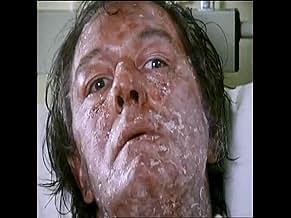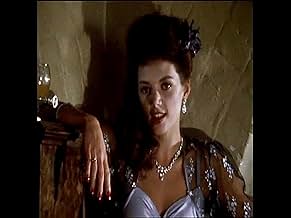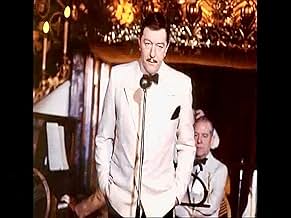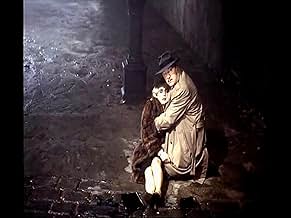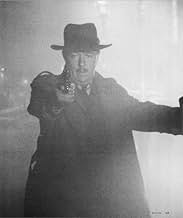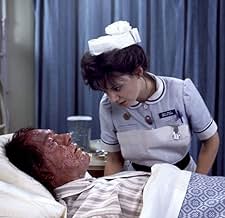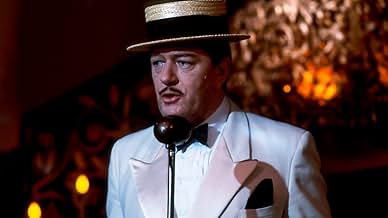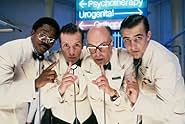The Singing Detective
- Mini serie TV
- 1986
- 1h 10min
VALUTAZIONE IMDb
8,5/10
5014
LA TUA VALUTAZIONE
Aggiungi una trama nella tua linguaTormented and bedridden by a debilitating disease, a mystery writer relives his detective stories through his imagination and hallucinations.Tormented and bedridden by a debilitating disease, a mystery writer relives his detective stories through his imagination and hallucinations.Tormented and bedridden by a debilitating disease, a mystery writer relives his detective stories through his imagination and hallucinations.
- Ha vinto 3 BAFTA Award
- 6 vittorie e 8 candidature totali
Sfoglia gli episodi
Recensioni in evidenza
There's no point in reiterating the praise for this miniseries. Many have called it the best television production ever, and as far as I can tell, they're absolutely correct. This is (NBC notwithstanding) the true definition of 'must-see TV'.
I just want to comment on something that struck me when I watched this recently on DVD. There's no way that an actor like Michael Gambon could ever get cast as the leading man in an American production (for TV or movies). He's just not physically attractive enough in the conventional sense; for example, he has the beginnings of a double-chin (more of a sloping-down from his chin to his collar), and I can't imagine any American producer being willing to give such an "not hot" actor so much screen time in the lead role.
Yet, it hardly needs be said, he is 100% perfect in this role, and it's hard to imagine anyone else doing as good a job. He can convey more feeling (rage, helplessness, love, hatred) in one close-up of his eyes than some actors do in their entire careers. His presence in this film is, in a sense, a reminder of how lucky we all are that it ever got made at all, by a BBC that was willing to give producer Kenith Trodd almost complete autonomy, as long as he stayed within budget. With the possible exception of HBO, you just don't see that sort of artistic freedom too often over on this side of the pond.
Anyway, as others said, it's a masterpiece, brilliantly written and brilliantly acted. Truly one of the most incredible uses of the television medium ever.
I just want to comment on something that struck me when I watched this recently on DVD. There's no way that an actor like Michael Gambon could ever get cast as the leading man in an American production (for TV or movies). He's just not physically attractive enough in the conventional sense; for example, he has the beginnings of a double-chin (more of a sloping-down from his chin to his collar), and I can't imagine any American producer being willing to give such an "not hot" actor so much screen time in the lead role.
Yet, it hardly needs be said, he is 100% perfect in this role, and it's hard to imagine anyone else doing as good a job. He can convey more feeling (rage, helplessness, love, hatred) in one close-up of his eyes than some actors do in their entire careers. His presence in this film is, in a sense, a reminder of how lucky we all are that it ever got made at all, by a BBC that was willing to give producer Kenith Trodd almost complete autonomy, as long as he stayed within budget. With the possible exception of HBO, you just don't see that sort of artistic freedom too often over on this side of the pond.
Anyway, as others said, it's a masterpiece, brilliantly written and brilliantly acted. Truly one of the most incredible uses of the television medium ever.
Although my comments could belong under the 2003 film version, I choose rather to make the comparison here because the film, more than anything else, gives reinforcement to the view that there are reasons this original miniseries is 6 hours long.
In the original, there really isn't a wasted minute of it's 6-hour running time. The complexity of this man's situation requires that the story reveals several different conflicts in his life simultaneously, and how they relate and resolve through psychiatry, The Singing Detective writing, his relationships (past and present), and the music that had become so important in his life. For the film version, because most of this can't be explored in such a short amount of time, most of these elements aren't included. As a result, the film is light and detached... and forgettable.
Apart from that. as another reviewer here pointed out, the acting and casting is MUCH MUCH better in this original despite the lack of famous handsome Hollywood faces (the 2003 film features Mel Gibson sporting a bald head piece to look like a 'nerdy' psychiatrist!).
I'm not an easy critic, but this version is in my top five of all time (movies, not TV- it feels more like a movie that TV to me). 10 of 10
In the original, there really isn't a wasted minute of it's 6-hour running time. The complexity of this man's situation requires that the story reveals several different conflicts in his life simultaneously, and how they relate and resolve through psychiatry, The Singing Detective writing, his relationships (past and present), and the music that had become so important in his life. For the film version, because most of this can't be explored in such a short amount of time, most of these elements aren't included. As a result, the film is light and detached... and forgettable.
Apart from that. as another reviewer here pointed out, the acting and casting is MUCH MUCH better in this original despite the lack of famous handsome Hollywood faces (the 2003 film features Mel Gibson sporting a bald head piece to look like a 'nerdy' psychiatrist!).
I'm not an easy critic, but this version is in my top five of all time (movies, not TV- it feels more like a movie that TV to me). 10 of 10
The Singing Detective is one of those great works that inspire something deep within the viewer, leaving them both shaken and elated by the spectacle they have just witnessed. Few cinematic works can inspire such a feeling, let alone a work for television; and it is this sense of genius that elevates this work above the comparatively "okay" likes of say, Cracker, Brideshead Revisited, and Prime Suspect et al. This is down to the fact that The Singing Detective is a work far greater than anything else; a microcosm of life, love, anger, defeat, consciousness and the sub-conscious. It deals with the intricate realms of fantasy and reality, the written, the understood and the real. If this sounds complicated then we're on the right track, because this is one of Dennis Potter's most detailed narrative constructs. The story chronicles a writer's decent into personal hell, as well as a decent into a book being written in his own imagination and a book written many years before; with his past, present and future all jostling for our attention throughout the epic, six-hours-plus running-time.
It is a testament to Potter's ability as a screenwriter that the whole thing zips along so quickly, with the multi-layered story never pausing for a moment; constantly being carried along at every step by the combined genius of Potter's characters, the skillful and visually rich direction of Jon Amiel and that towering central performance from the brilliant Michael Gambon. The writing is truly ecstatic, with Potter obviously relishing every chance he gets to play with both the musical and detective-movie clichés - bringing to mind both Casablanca and Potter's own-classic Pennies From Heaven - whilst the dialog of Gambon's inner-monologues have more in common with the profane poetry of 60's playwrights that anything you'd expect to hear on BBC 2. The story also has obvious political overtones, with Potter using the hospital setting of the present sequences to double as an allegory of 80's Britain under the tyrannical leadership of Margaret Thatcher (bringing to mind the Elvis Costello song Tramp the Dirt Down and those other hospital set political parables, One Flew Over the Cuckoo's Nest and Britannia Hospital).
The story is also somewhat semi-autobiographical from Potter's point of view, with the writer, at this point in time, suffering from the same psoriatic-arthritis that Gambon's character Marlow has (creating that devastating, iconic image of the paralytic Marlow languishing half-naked in bed, being greased by a young Joanne Whally). There are also the much deeper autobiographical aspects with the young Marlow's childhood in the shady and evergreen Forest of Dean, in which the pastoral setting gives way to some truly shocking moments; recalling similar childhood traumas from such diverse examples as Iain Bank's Complicity and Rob Reiner's film Stand by Me. However, within this mire of bitterness, surrealism, bouts of lip-synced cabaret and phantasmagorical shoot-outs, there is also a great deal of humour. Anyone who has seen one of Potter's early TV plays or, for that matter, later classics like Karaoke and Cold Lazarus will know of his depth and range as both a humorist and a satirist; and it is this darkly acerbic wit that underlines the central narrative strands of The Singing Detective.
Some would argue that this is the best that television has to offer, though I would politely disagree. The Singing Detective is a work of art too good to be considered simply for television. Now, thanks to the magic of DVD we have the chance to experience Potter's classic in its definitive unabridged, unedited, uninterrupted from. A truly great piece of work.
It is a testament to Potter's ability as a screenwriter that the whole thing zips along so quickly, with the multi-layered story never pausing for a moment; constantly being carried along at every step by the combined genius of Potter's characters, the skillful and visually rich direction of Jon Amiel and that towering central performance from the brilliant Michael Gambon. The writing is truly ecstatic, with Potter obviously relishing every chance he gets to play with both the musical and detective-movie clichés - bringing to mind both Casablanca and Potter's own-classic Pennies From Heaven - whilst the dialog of Gambon's inner-monologues have more in common with the profane poetry of 60's playwrights that anything you'd expect to hear on BBC 2. The story also has obvious political overtones, with Potter using the hospital setting of the present sequences to double as an allegory of 80's Britain under the tyrannical leadership of Margaret Thatcher (bringing to mind the Elvis Costello song Tramp the Dirt Down and those other hospital set political parables, One Flew Over the Cuckoo's Nest and Britannia Hospital).
The story is also somewhat semi-autobiographical from Potter's point of view, with the writer, at this point in time, suffering from the same psoriatic-arthritis that Gambon's character Marlow has (creating that devastating, iconic image of the paralytic Marlow languishing half-naked in bed, being greased by a young Joanne Whally). There are also the much deeper autobiographical aspects with the young Marlow's childhood in the shady and evergreen Forest of Dean, in which the pastoral setting gives way to some truly shocking moments; recalling similar childhood traumas from such diverse examples as Iain Bank's Complicity and Rob Reiner's film Stand by Me. However, within this mire of bitterness, surrealism, bouts of lip-synced cabaret and phantasmagorical shoot-outs, there is also a great deal of humour. Anyone who has seen one of Potter's early TV plays or, for that matter, later classics like Karaoke and Cold Lazarus will know of his depth and range as both a humorist and a satirist; and it is this darkly acerbic wit that underlines the central narrative strands of The Singing Detective.
Some would argue that this is the best that television has to offer, though I would politely disagree. The Singing Detective is a work of art too good to be considered simply for television. Now, thanks to the magic of DVD we have the chance to experience Potter's classic in its definitive unabridged, unedited, uninterrupted from. A truly great piece of work.
10jimi99
There's no question that the greatest films of the past 25 years have been TV miniseries, from "I Claudius" to "The Decalogue" to "Nicholas Nickleby" to "The Singing Detective." The ability to stretch out over 6 to 10 hours is certainly a key to doing justice to a theme or great work of literature.
"The Singing Detective" is a bold, multileveled BBC series that is made all the more powerful considering that it is based on the author Dennis Potter's losing battle with a skin disease combined with his incredibly rich fantasies, painful memories, and writer's imagination, all rolled into one complex narrative. Over the 6-hour span, his life and personality, as portrayed by the brilliant Michael Gambon as the writer/novel protagonist Philip Marlow (without the "e"), is revealed inventively and poignantly. We sympathize with his wasting disease, admire his clever mind, and see all his hang-ups and "sins" gradually bared to his audience. It is an amazing swan song for a brutally self-honest writer.
Jon Amiel's direction is impeccable, and the whole production is uncompromising regarding sex, nudity, language and emotional pain. The famous musical numbers featuring not only Philip and his father in the past, but projected onto the patients and staff of the hospital ward where the "real" present action takes place, are so integral to the story that they are a perfect reflection of Philip's tenuous grip on reality.
The forthcoming Keith Gordon feature film, no matter how inventive and bizarre it is, must fail artistically and be suspected of dishonoring the essence of the story, Dennis Potter's autobiography. It will probably succeed financially with the casting of Downey and Gibson, but please find the BBC series at your local library and enjoy this masterpiece.
"The Singing Detective" is a bold, multileveled BBC series that is made all the more powerful considering that it is based on the author Dennis Potter's losing battle with a skin disease combined with his incredibly rich fantasies, painful memories, and writer's imagination, all rolled into one complex narrative. Over the 6-hour span, his life and personality, as portrayed by the brilliant Michael Gambon as the writer/novel protagonist Philip Marlow (without the "e"), is revealed inventively and poignantly. We sympathize with his wasting disease, admire his clever mind, and see all his hang-ups and "sins" gradually bared to his audience. It is an amazing swan song for a brutally self-honest writer.
Jon Amiel's direction is impeccable, and the whole production is uncompromising regarding sex, nudity, language and emotional pain. The famous musical numbers featuring not only Philip and his father in the past, but projected onto the patients and staff of the hospital ward where the "real" present action takes place, are so integral to the story that they are a perfect reflection of Philip's tenuous grip on reality.
The forthcoming Keith Gordon feature film, no matter how inventive and bizarre it is, must fail artistically and be suspected of dishonoring the essence of the story, Dennis Potter's autobiography. It will probably succeed financially with the casting of Downey and Gibson, but please find the BBC series at your local library and enjoy this masterpiece.
About to watch the 'The Singing Detective' in its entirity for the first time in 18 years, one is filled with anticipation but also anxiety. Supposing it's dated, or that its once revolutionary nature has been so widely copied (one thinks here of its multi-layered structure, or the scene where Michael Gambon tries to avoid having an erection) that it will be impossible to remember quite how fresh it seemed on first viewing. Worst of all, perhaps it's simply not as good as remembered? When the piece started slowly, I feared that disappointment indeed awaited. But soon I fell again into its magical rhythmns, and, mesmerised, have just (with the aid of DVD) consumed the final five hours in a single weekend. Mesmerised but not surprised - the power of the piece is such that almost every scene, almost every line of dialogue seemed familiar. The last film I saw I had in fact seen previously, and much less than 18 years before, but I had forgotten it entirely and would not have even realised except for a one memorable detail. By contrast, in Dennis Potter's masterpiece, when a single scene failed to trigger recognition, it seemed horribly wrong, as every other incident was written on my brain.
For those who don't know, 'The Singing Detective' is an offbeat musical about a writer in hospital, that weaves effortlessly his present experiences, his past fictions, his paranoid imaginings and, above all else, the memories of a childhood that to this day still dominates his life. Wildly imaginative, but grounded in Potter's own autobiography, it constitutes an enormously rich and vivid telling of a fundamentally very simple story. Potter celebrates life, but refuses to assign it any false dignity. The extent to which he strips away the cant that helps make life bearable is truly disturbing, and perhaps explains the reason the religious right wanted it banned. The cover of my DVD says 'moderate nudity; mild language; no violence' and by modern standards this is correct. Which only damns the moderns; but Potter knew truly how to shock.
Put simply, everything is right about this series. The dialogue is caustic and hilarious; the direction spot on; the acting brilliant. The song and dance routines are coreographed precisely, economically, but to devastating effect. In fact, the construction of the whole work has the feel of jazz to it, the same themes repeated with minor variation, building to a whole that exceeds the mere parts. And the faces in this drama are the most wonderfully expressive faces you will ever see. I was going to call their expressiveness stylised, in that no-one's real face ever really gives away so much. But these, of course, are the faces of the memory, a lifetime's trauma captured in a single tearful eye.
The cast clearly rose to the material. Gambon gives a virtuoso acting masterclass, supreme in both his roles (he plays both the writer and his creation); and though the writer undergoes a major personal journey during the course of this story, Gambon is as good at the end as at the start. While Joanne Whalley, Bill Paterson (with his beard and accent, he makes me think of Robin Cook!) and (in a virtually silent role) Jim Carter have never done anything better. Often overlooked, meanwhile, is the stunning performance from (the subsequently obscure) Lyndon Davies from as Gambon's younger self.
Potter spent his entire career trying new ways of writing screenplays. It didn't always come off and after this work, little he produced was of merit. But 'The Singing Detective' hits no false notes. If there's been a better series made for television, I haven't seen it.
For those who don't know, 'The Singing Detective' is an offbeat musical about a writer in hospital, that weaves effortlessly his present experiences, his past fictions, his paranoid imaginings and, above all else, the memories of a childhood that to this day still dominates his life. Wildly imaginative, but grounded in Potter's own autobiography, it constitutes an enormously rich and vivid telling of a fundamentally very simple story. Potter celebrates life, but refuses to assign it any false dignity. The extent to which he strips away the cant that helps make life bearable is truly disturbing, and perhaps explains the reason the religious right wanted it banned. The cover of my DVD says 'moderate nudity; mild language; no violence' and by modern standards this is correct. Which only damns the moderns; but Potter knew truly how to shock.
Put simply, everything is right about this series. The dialogue is caustic and hilarious; the direction spot on; the acting brilliant. The song and dance routines are coreographed precisely, economically, but to devastating effect. In fact, the construction of the whole work has the feel of jazz to it, the same themes repeated with minor variation, building to a whole that exceeds the mere parts. And the faces in this drama are the most wonderfully expressive faces you will ever see. I was going to call their expressiveness stylised, in that no-one's real face ever really gives away so much. But these, of course, are the faces of the memory, a lifetime's trauma captured in a single tearful eye.
The cast clearly rose to the material. Gambon gives a virtuoso acting masterclass, supreme in both his roles (he plays both the writer and his creation); and though the writer undergoes a major personal journey during the course of this story, Gambon is as good at the end as at the start. While Joanne Whalley, Bill Paterson (with his beard and accent, he makes me think of Robin Cook!) and (in a virtually silent role) Jim Carter have never done anything better. Often overlooked, meanwhile, is the stunning performance from (the subsequently obscure) Lyndon Davies from as Gambon's younger self.
Potter spent his entire career trying new ways of writing screenplays. It didn't always come off and after this work, little he produced was of merit. But 'The Singing Detective' hits no false notes. If there's been a better series made for television, I haven't seen it.
Lo sapevi?
- QuizThe first time Sir Michael Gambon was wheeled onto set in his full make-up, all the cast and crew were reduced to a stunned silence. Gambon broke the ice by saying "What's all this fuss about Chernobyl then? I went there for a holiday and it didn't do me any harm."
- Citazioni
Philip Marlow: I used to think that all I wanted was the good opinion of honorable men and the ungrudging love of beautiful women. Now I know for sure that all I really want is a cigarette.
- ConnessioniFeatured in Arena: Dennis Potter (1987)
- Colonne sonorePeg o' My Heart
(uncredited)
Music by Fred Fisher
Performed by Max Harris & His Novelty Trio during the credits
I più visti
Accedi per valutare e creare un elenco di titoli salvati per ottenere consigli personalizzati
Dettagli
Contribuisci a questa pagina
Suggerisci una modifica o aggiungi i contenuti mancanti

Divario superiore
By what name was The Singing Detective (1986) officially released in India in English?
Rispondi

